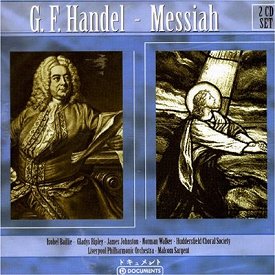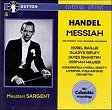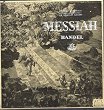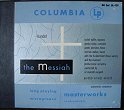
|
SITE RATING: 4/10 SITE
REVIEW: Malcolm
Sargent's first Messiah recording for
Columbia Records from 1946 is another
performance very much of its times, with
full-throated, unrestrained singing and
playing from the soloists, orchestra, and
choir, revealing not so much their lack of
finesse, as the challenges of capturing such
large forces in the mid-1940s. Everyone
had to project strongly in order to achieve
the balance necessary with still relatively
primitive equipment. Sargent's first Messiah
uses much the same forces as his later outstanding 1959
recording, with the Liverpool
Philharmonic and Huddersfield Choral Society
taking the ensemble duties, and sounding much
worse here than their latter collaboration,
with some of the blame shared equally between
Sargent's tempos, which take on the
characteristics of drying paint, and the poor
sound, with the mono recording sounding very
muddy and thick. Add to that the choir's
flat, strident vowels, and the orchestra
sounding as if it was recorded inside a
cardboard box, and you have a frustrating
listening experience. The soloists leave
much to be desired, with Gladys Ripley's
fluttery alto and tenor James Johnston's
overheated arias too much for me; bass Norman
Walker has a pleasant tone and general
delivery, but falters against better
latter-day choices, and soprano Isobel Baillie
posessing a flutey, quavering tone that was
extremely curious, but also ill-matched with
the material. Out of print in the United
States, but cheaply available through the
German TIM Company, this is a Messiah
that will only be of interest to historic
musicologists.
|



